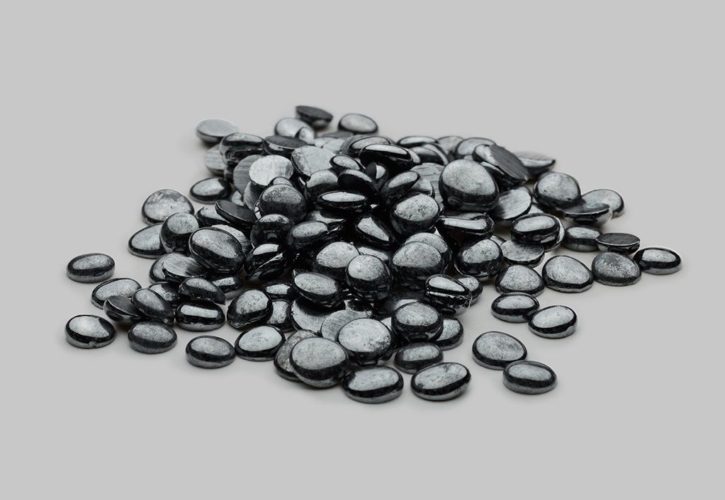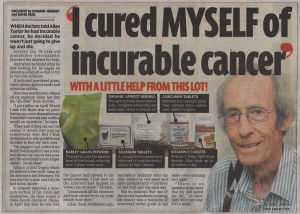Selenium Alternative Cancer Treatment: Your Complete Guide

Not only has selenium been found in a number of scientific studies to destroy cancer cells, a 78-year-old Grandfather has recently used selenium, in combination with other nutritional strategies, to cure himself of cancer that his doctor told him was “incurable”.
Selenium, a trace element found in beef, chicken, mushrooms, nuts and seeds, and seafood, plays a key role in cellular metabolism by acting as an antioxidant to protect cells from damage.
It has received much attention from the scientific community in the past 30 years, and has been studied extensively for its effects against various types of cancer. As you will find out in the studies listed and summarized below, selenium is toxic to cancer cells in supranutritional doses, and even effective against cancer cells resistant to chemotherapeutic agents.
TABLE OF CONTENTS
Man Cures Himself of Cancer with Nutrition
 When 78-year-old retired oil-rig engineer Allan Taylor was diagnosed with cancer in 2012, his doctor told him it was “incurable”. “I got a letter on April 30 and I was told there was no point having any more chemotherapy, it wouldn’t cure me and neither would an operation,” he says. “But I was determined to stay positive and decided to find my own cure.”
When 78-year-old retired oil-rig engineer Allan Taylor was diagnosed with cancer in 2012, his doctor told him it was “incurable”. “I got a letter on April 30 and I was told there was no point having any more chemotherapy, it wouldn’t cure me and neither would an operation,” he says. “But I was determined to stay positive and decided to find my own cure.”
Allan took his doctors death-sentence as a challenge, and began an intensive nutrition-based therapy to treat his own cancer. The remedy he used consisted of turmeric, Vitamin B17, selenium tablets and powdered grass. Just four months after beginning his alternative nutrition-based cancer treatment, Allan received the “all-clear” from doctors. “On August 6 I got a letter from North Tees hospital to say a scan had shown my cancer had gone and ‘the abnormality is no longer visible’. I’m all clear.”
10 Studies on Selenium vs Cancer
- One of the first and most significant selenium studies on cancer was conducted in 1996 by Dr. Larry Clark, and published in the Journal of the American Medical Association. In this double-blind, randomized trial, 1312 skin cancer patients were studied for 8 years while supplementing with 200mcg selenium, or placebo. Patients treated with selenium were found to have a reduction in all-cause mortality, significant reductions in cancer mortality. Researchers found that cancer deaths for those taking selenium were reduced by almost 50%.
- In a study investigating nutritional supplements effects against cancer in 2004, researchers at the Institute for Cancer Prevention found that both both naturally occuring and synthetic selenium compounds “alter genes in a manner that leads to inhibition of cell proliferation and induction of apoptosis”. Restated, selenium stopped cancer cell growth, and induced cancer cell death.
- “It is well established that selenium at higher doses readily can turn into a prooxidant and thereby exert its potential anticancer properties,” reported researchers in a review of studies published in the US National Library of Medicine on selenium.
- Beta Glucans are a compound found in mushrooms, like the cancer-blasting Turkey Tail mushroom, and have been found to have potent anti-cancer effects. University of Louisville researchers conducted a study in 2014 assessing the potential synergistic effects of Beta Glucans in combination with Selenium. “Using three different models of murine cancer, we showed that this combination strongly suppressed the growth of all three types of cancers,” concluded researchers.
- After discussing the fact that supranutritional doses of selenium have are toxic to cancer cells and even chemotherapeutic-resistant cancer cells, researchers conducted a study to figure out the mechanism by which selenium kills cancer cells. They discovered that the mechanism of cancer cell death by selenium is its ability to increase extracellular glutathione, a powerful antioxidant which, according to Dr. Mark Hyman, is “the mother of all antioxidants”.
- A 2003 study examining the antioxidant role of selenium compounds found that “in cells treated with methylselenocyanate or Se methylselenocysteine, the cell cycle progression was blocked at the G(1) phase” and death of cancer cells was induced by apoptosis.
- Researchers investigated the effect of adding Selenium to chemotherapy treatment at the University of Medicine and Science in Los Angeles, California. The results of this study in the year 2000 speak for themselves: “Selenium has a significant anti-neoplastic effect on breast, lung, liver, and small intestinal tumor cells. Supplementation of Selenium enhanced chemotherapeutic effect of Taxol and Doxorubicin in these cells beyond that seen with the chemotherapeutic drugs used alone.”
- Previous studies have found that selenium was effective in reducing prostate, colon, lung and breast cancers, so researchers wanted to figure out the mechanism behind its anti-cancer activity. Since estrogen is critical for the development of breast cancer, the present study examined the effect of selenium on estrogen receptor activation. Researchers discovered that selenium decreased the negative impact that estrogen had on cellular metabolism.
- In a 2014 study, researchers investigated “the relationship between carcinogenic elements, arsenic (As), cadmium (Cd), and nickel (Ni), and anti-carcinogenic elements, selenium (Se) and zinc (Zn), in the scalp hair of different female cancer patients”. What they discovered was that in scalp hair samples of cancer patients, the levels of carcinogenic elements arsenic, cadmium, and nickel were found to be significantly higher, with low levels of selenium and zinc. In people without cancer, the opposite was discovered, higher levels of selenium and zinc, and lower levels of the carcinogenic elements arsenic, cadmium, and nickel.
- A 1991 study out of the University of Illinois examined dietary selenium (selenite) on breast cancer, and found that “selenite can inhibit the initiation stage of mammary carcinogenesis.”
How Does it Work?
As the studies summarized above suggest, the mechanism of cancer cell death caused by selenium is its ability to increase extracellular glutathione, an antioxidant that plays a role so critical in eliminating toxins from the body, that Dr. Mark Hymann has called it “the mother of all antioxidants”.
Conclusion
The existing body of research on selenium shows clearly its ability to inhibit cancer cell growth and cause cancer cell death. Between the research and the real-life examples of people using selenium in the successful treatment and elimination of cancer, the evidence suggests selenium holds great promise as a nutritional-based cancer therapy.
Resources Used:
– WholeFoodsMagazine
– Mirror.co.uk
– WebMD
– DrHyman
– Wikipedia
– NaturalNews
